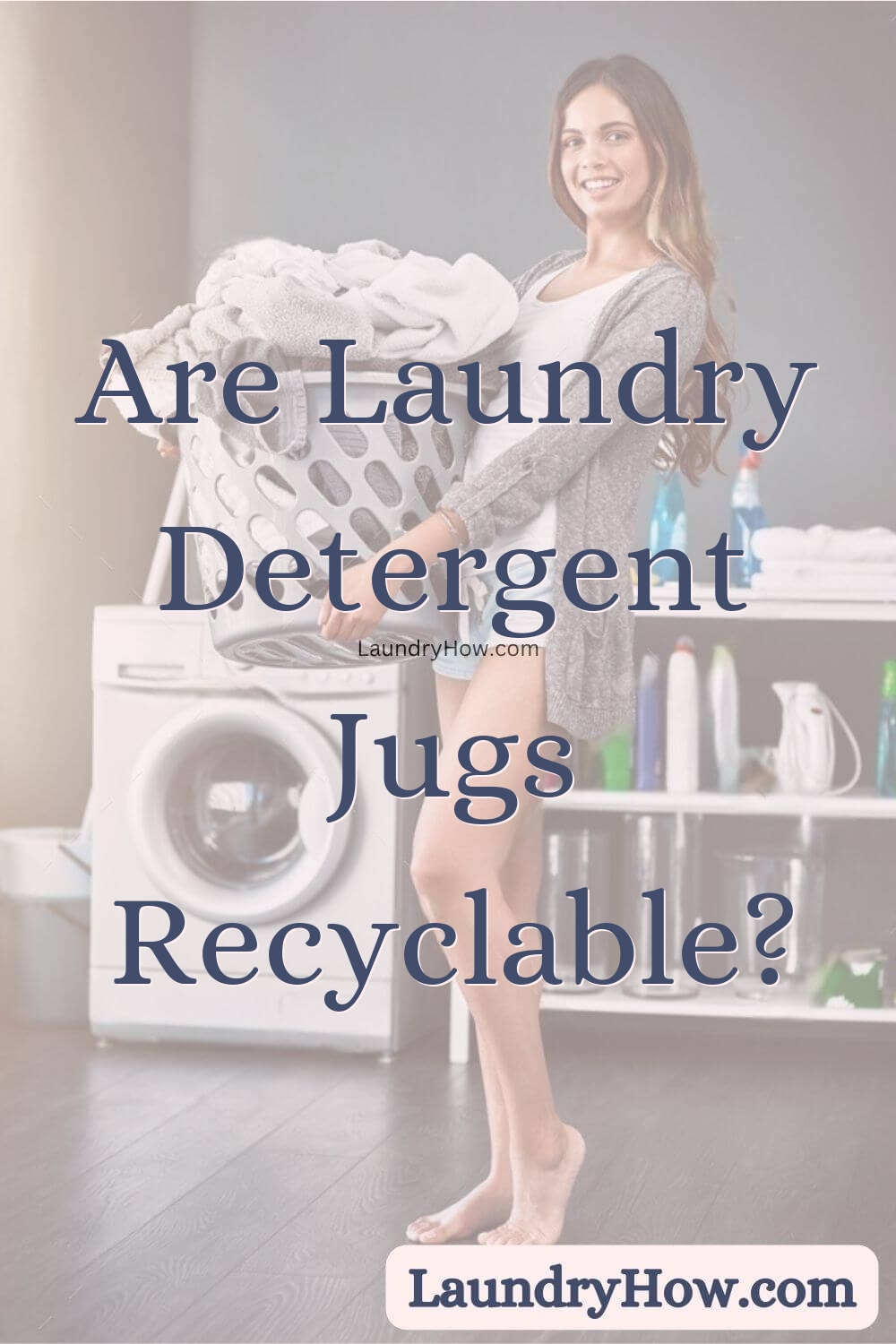Detergent jugs, the plastic containers that hold liquid laundry detergent, are a common household item. As consciousness around sustainability and recycling increases, many people wonder if these bulky plastic containers can be recycled. The answer is yes – laundry detergent jugs can and should be recycled.
Recycling these jugs keeps plastic out of landfills and waterways. It also allows the plastic to be remade into new products, reducing reliance on virgin plastic production. With proper care and preparation, recycling empty laundry detergent jugs is easy. Let’s look at some key questions around recycling these containers:
What Kind of Plastic Are Laundry Detergent Jugs Made From?
Laundry detergent jugs are most commonly made from a plastic called high-density polyethylene (HDPE). HDPE is marked with the chasing arrows recycling symbol with a “2” in the middle.
HDPE is one of the most commonly recycled plastics. It’s accepted by most municipal recycling programs as well as retail drop-off locations. Sturdy and versatile, HDPE is recycled into many new products like buckets, bottles, playground equipment, and plastic lumber.
Do I Need to Clean Out the Jug Before Recycling?
Before placing your empty laundry detergent jug in the recycling bin, it’s important to properly rinse it out. Any remaining soap residue should be washed out. The jug should be empty – recycle the cap separately.
Proper cleaning is essential for both health and safety reasons, and to avoid contaminating other recyclables with residue. It also prevents odors and messes. Quickly rinsing jugs with warm water right after they’re emptied makes cleaning easy.
How Should I Prepare the Jug for Curbside Pickup?
Once cleaned, remove the cap and make sure no liquid remains inside the container. Replace the cap loosely – this keeps the jug intact for collection and processing.
If your community uses single stream recycling, you can place the jug directly into your recycling bin. Make sure it’s clean and empty. Squishing large containers helps save space if your bin is full.
If you have separate recycling pickup for plastics, place the jug in that bin on collection day. Follow any specifications from your local recycling program. Preparation processes can vary between communities.
Can I Recycle Laundry Detergent Jugs if They Still Have Product Left?
For safety and hygiene reasons, laundry detergent jugs should only be recycled if completely empty. Leftover liquid residue can spill and pose hazards for waste collectors and processors. Any remaining product could also contaminate other recycled materials.
Before recycling, use up the remaining detergent and properly rinse out the container. You can also look into donating any unused product to charity or community programs if the detergent is still sealed and shelf-stable.
What About Other Bottle Closures Like Spouts or Pumps?
Some liquid laundry detergent containers feature built-in pouring spouts, pumps, or caps with openings to allow easier dispensing. Remove any attached closures before recycling empty jugs. These lid attachments or pour systems cannot be effectively recycled.
However, the main jug and basic cap still can be processed if emptied, cleaned, and separated from any dispensing hardware. Remove and dispose any attached pour mechanism. Recycle the main jug body and loose cap in your plastics recycling container.
Can I Recycle Detergent Jug Caps?
Yes, the basic screw-on caps from laundry detergent jugs can and should be recycled. The caps are usually made from a polyethylene plastic similar to the jugs themselves.
After removing the cap from an emptied detergent jug, give it a quick rinse if needed. Make sure no residual soap remains. You can place plastic caps in with your plastic recycling. If in doubt, check if your community recycles caps – policies can vary between areas. Squishing them helps save space.
Are There Any Special Considerations for Recycling Detergent Jugs?
Laundry detergent jugs are very large, bulky containers compared to items like soda bottles. Their size makes them awkward items to collect and sort for recycling.
When preparing detergent jugs, take any steps you can to make them easier to handle. Crushing or squishing containers helps facilities compact them into bales more easily. Remove any dispensing hardware rather than leaving it attached.
If your community offers recycling drop-off depots, use them for large plastics when possible rather than curbside pickup. This spares manual handlers from hefting extremely bulky containers. Every action that makes processing easier supports sustainable and safe recycling.
What Kinds of Items Can Become Recycled Detergent Jugs?
Once recycled, cleaned HDPE plastic detergent jugs can be remanufactured into many new products containing post-consumer resin (PCR). Laundry jugs commonly get turned into new detergent bottles, milk jugs, plastic lumber, bins and buckets, floor tiles, pipes, outdoor deck materials, and traffic barricades.
In Conclusion
Empty, cleaned laundry detergent jugs are widely accepted for recycling alongside other HDPE plastics. Properly preparing them by removing any closures, rinsing away residue, and replacing lids helps the jugs get successfully processed and turned into new materials. This keeps tons of plastic out of landfills and gives bulky containers a second life.
By recycling HDPE detergent jugs through local municipal curbside programs or community recycling depots, households can meaningfully reduce waste. Simple steps like proper cleaning, removing closures, and squishing containers helps facilitate easy, efficient recycling. With a basic understanding of how to handle detergent jugs, this common packaging can be sustainably recycled almost anywhere.
References
American Cleaning Institute. (n.d.). Empty and recycle your detergent bottles. https://www.cleaninginstitute.org/cleaning-tips/empty-and-recycle-your-detergent-bottles
Delaware Solid Waste Authority. (2020, July 15). A fresh look for recycling: Detergent and cleaning supply bottles. https://dswa.com/a-fresh-look-for-recycling-detergent-and-cleaning-supply-bottles/
Judson, S. & Babbitt, C.W. (2011). Cradle to cradle: Reverse logistics strategies and opportunities across three industry sectors. International Journal of Production Economics. https://www.sciencedirect.com/science/article/abs/pii/S0925527310004554
Plastic Expert. (2020, September 17). Can you recycle laundry detergent bottles? https://www.plasticexpert.co.uk/can-you-recycle-laundry-detergent-bottles/

Laura has had an enthusiasm for laundry ever since she was a teenager experimenting with wash cycles. She went on study textile science in college before working in product testing.
Soon, Laura found friends and family constantly asking her laundry advice, realizing she had become an unofficial laundry guru. The questions kept coming in, so Laura decided to start sharing laundry tips online to help more people. The enthusiastic response led her start the blog “Laundry How”.
Now in her late thirties, Laura uses Laundry How to tackle all kinds of laundry topics – stains, fabric care, detergents, and more. She provides advice from both her studies and experience testing techniques out firsthand. Laura continues to grow an engaged community of laundry learners, feeling fulfilled empowering people to make laundry an easy, confidence-building ritual rather than a dreaded chore.
